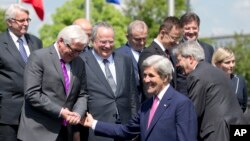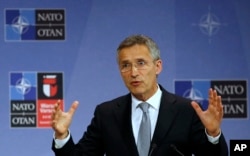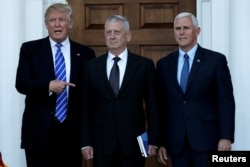NATO Foreign ministers face a busy agenda as they meet for year-end talks Tuesday in Brussels. But at a time when the alliance faces myriad challenges, the biggest issue is not on the official agenda: What NATO course will Donald Trump chart when he becomes U.S. president?
“Trump will be on everybody’s mind,” says analyst Sven Biscop of the Egmont Institute, a Brussels-based research group, before the two-day meeting in Brussels.
The President-elect’s conflicting remarks about the Atlantic alliance and his controversial calls and tweets, including a telephone chat with Taiwan’s president Tsai Ing-Wen that irked Beijing, have fed European concerns, analysts say, while his choices for key security posts have sparked a mixed response.
Working together
NATO Secretary-General Jens Stoltenberg did not directly address those questions at a news conference Monday, saying only he was “looking forward to working” with Trump and his team.
Stoltenberg earlier expressed confidence Washington’s commitment to its alliance will not change, despite Trump’s campaign claims the United States may not necessarily come to the defense of NATO members who fail to pay their dues.
“The Europeans will want to emphasize their commitment to European defense and keep America tied to NATO and Article 5 (on collective defense),” said Andrew Dorman, a NATO expert at London policy institute Chatham House.
This week’s talks will also mark the last major NATO meeting under the Obama administration, and a farewell to U.S. Secretary of State John Kerry.
“The Europeans will be trying to get a feel of what the heck a Trump administration is going to be like,” Dorman said. “And it’s not clear Kerry is going to be able to tell them that much. He’s probably guessing as much as anyone else.”
Defense funding threat
This week’s meeting comes days after the European Union unveiled an ambitious new plan for defense funding and research, including a $5.36 billion annual investment fund.
While Washington has for years called on the Europeans to increase their defense spending, Trump’s tough remarks appear to have hit home, analysts say. The United States bankrolls about 70 percent of NATO's budget. Only four members, Britain, Estonia, Greece and Poland, meet alliance commitments of earmarking at least two percent of their GDP on defense.
Last week, Lithuania’s president Dalia Grybauskaite said her country would meet the NATO target by 2018, even as she called on Trump to uphold NATO commitments.
“It’s really interesting to see how Trump is pushing the Europeans to react,” says Alexandra de Hoop Scheffer, Paris office director for The German Marshall Fund of the United States. “When you meet with military commanders in France, they’ll say, ‘We want to prove that Trump is wrong.’ That’s the leitmotif of what you’re hearing.”
Brexit, Iran, Russia
Brexit is providing another push for closer military cooperation among the EU’s remaining members, with heavyweights France and Germany leading the way.
“The UK has been blocking the creation of the European Union’s own operational headquarters,” says Dorman of Chatham House. “That will go ahead now.”
While Trump’s selection of retired general James Mattis as defense secretary has earned European praise, his positive remarks about Russian President Vladimir Putin and his threats to tear up the Iran nuclear agreement have unsettled many allies.
On Iran, European allies may break strongly with Trump if he tries to undo the nuclear deal, Biscop says. For Europeans, the normalization of relations with Iran is absolutely uncontroversial,” he said. “There’s no desire to go back on that.”
Russia is more complex. While Europeans maintain their sanctions and tough talk against Moscow on issues like Ukraine and Syria, France’s conservative presidential candidate Francois Fillon is among those pushing for a more accommodating policy toward Moscow.
“I think the concern now in Europe is where is Trump’s red line when it comes to Russia. Is he willing to formalize Crimea’s annexation? Or to find a solution with Putin in Iraq and Syria?” said de Hoop Scheffer.
Those questions are unlikely to go away, de Hoop Scheffer predicts Moscow will flex its military muscles in the weeks before Trump’s January inauguration.
“Putin will be testing Trump to see how he reacts,” she said.







